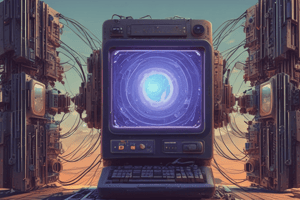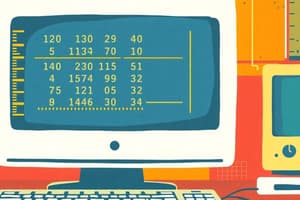Podcast
Questions and Answers
What is a computer?
What is a computer?
A programmable machine that converts raw data into useful information.
What characterizes first-generation computers?
What characterizes first-generation computers?
- Compact size
- Used vacuum tubes (correct)
- Emitted a lot of heat (correct)
- High reliability
Who created the Z1 through Z3 computers?
Who created the Z1 through Z3 computers?
Konrad Zuse
What was the significance of the Atanasoff–Berry Computer (ABC)?
What was the significance of the Atanasoff–Berry Computer (ABC)?
Match the following computers with their creators and descriptions:
Match the following computers with their creators and descriptions:
What was the first working, digital, general-purpose computer?
What was the first working, digital, general-purpose computer?
What is the main function of a computer?
What is the main function of a computer?
The first-generation computers used __________.
The first-generation computers used __________.
Which of the following computers were developed between 1936 and 1941?
Which of the following computers were developed between 1936 and 1941?
Who is credited with inventing the electronic digital computer?
Who is credited with inventing the electronic digital computer?
The ABC was a fully functional computer.
The ABC was a fully functional computer.
What was the first working digital, general-purpose computer?
What was the first working digital, general-purpose computer?
Which computer predicted the outcome of the 1952 presidential election?
Which computer predicted the outcome of the 1952 presidential election?
The Harvard Mark 1 was used for __________ calculations.
The Harvard Mark 1 was used for __________ calculations.
Flashcards are hidden until you start studying
Study Notes
Functions of a Computer
- Computers are programmable machines that transform raw data into useful information.
- The information processing cycle involves collecting data (e.g., from a customer order form) and converting it into actionable information.
Evolution of Computer Hardware
- First-generation computers utilized vacuum tubes, resembling incandescent light bulbs, producing significant heat and marked by reliability issues.
- These computers were massive and employed manual switches for data processing.
Key First-Generation Computers
- Z1-Z3 (1936-1941, Germany): Developed by Konrad Zuse; mechanical and programmable but lacked recognition during the war.
- Atanasoff-Berry Computer (1942, USA): Created by Professor John Atanasoff and student Clifford Berry; pivotal in patent history, contrasting with ENIAC.
- Colossus (1944, UK): Designed by Tommy Flowers for code-breaking efforts; stayed secret until the 1970s.
- Harvard Mark 1 (1944, USA): Engineered by Howard Aiken and programmed by Grace Hopper; used for U.S. Navy's gunnery calculations until 1959.
- ENIAC (1946, USA): Developed by Presper Eckert and John Mauchly at the University of Pennsylvania; recognized as the first operational general-purpose computer.
- UNIVAC (1951, USA): Created by Eckert and Mauchly; notable as the first commercially available computer, famous for predicting the outcome of the 1952 presidential elections.
Functions of a Computer
- Computers are programmable devices that transform raw data into useful information.
- The information processing cycle plays a crucial role in this transformation, exemplified by how data from a customer order form is processed to fulfill an order.
Evolution of Computer Hardware
- First-generation computers utilized vacuum tubes resembling incandescent light bulbs; they produced excessive heat, were unreliable, and were massive in size.
- Manual switches were employed to process data in these early machines.
Notable First-Generation Computers
- Z1-Z3 (1936-1941): Created by Konrad Zuse in Germany; these machines were mechanical, programmable computers that faced challenges during WWII, including destruction by war.
- Atanasoff-Berry Computer (ABC) (1942): Developed by professor John Atanasoff and graduate student Clifford Berry at Iowa State College; never fully operational but led to Atanasoff winning a patent dispute, establishing him as the inventor of the electronic digital computer.
- Colossus (1944): Designed by Tommy Flowers in the UK, used by code-breakers to decipher German messages; its existence was kept secret until the 1970s.
- Harvard Mark 1 (1944): A significant machine programmed by Grace Hopper for the U.S. Navy to assist with gunnery and ballistic calculations, operational until 1959.
- ENIAC (1946): Developed by Presper Eckert and John Mauchly at the University of Pennsylvania; recognized as the first working, general-purpose digital computer.
- UNIVAC (1951): The world's first commercially available computer, created by Eckert/Mauchly; gained fame for accurately predicting the 1952 presidential election outcomes.
Studying That Suits You
Use AI to generate personalized quizzes and flashcards to suit your learning preferences.




